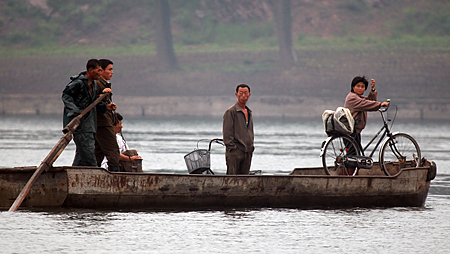
A group of North Koreans sail aboard a small boat down the Amrok River on the border of North Korea and China, on July 7, 2011. (Photo: Yonhap News - Newscom)
It’s safe to say that prioritizing — at least in a way the rest of the world can relate to — has never been one of the hallmarks of North Korean leader Kim Jong Il. While the nation’s International Olympic Committee was lobbying last week to co-host the 2018 Winter Olympics with the South, North Korean citizens were scouring the countryside for edible wild plants to ward off starvation in the latest food shortage to grip the impoverished nation.
The United Nations World Food Program (WFP) estimates some six million North Koreans will need food aid this year after a brutal winter and amidst an ongoing reduction in food aid from South Korea, the U.S., and Europe. The shortage — already the worst in a decade — got even more desperate last week when over 20,000 hectares of farmland reportedly went underwater in heavy rains, though some say the floods’ severity may have been exaggerated to extract aid from sympathetic foreign nations after an allegedly doctored photo was released to the AP.
Doctored or no, the situation is undeniably bleak in a country where a third of growing children suffer from stunted growth and a quarter of pregnant and breastfeeding women are malnourished. In an assessment conducted in February and March, the WFP, which has been working in North Korea since the mid-1990s, reported that the government food stocks that help feed 16 million people were nearly empty.
In response to the crisis, the European Commission (EC) announced earlier this month it would restart its food aid program, suspended in 2008, and send over $14 million in emergency food assistance to the nation, citing the fact that well over 500,000 North Koreans are in immediate danger of starvation. Kristalina Georgieva, European Union Commissioner for International Cooperation, Humanitarian Aid and Crisis Response, said in a statement: “The purpose of this aid package is to save the lives of at least 650 000 people who could otherwise die from lack of food. Our experts saw severely malnourished children in hospitals and nurseries where no treatment was available… Clearly, North Korea’s chronic nutrition problem is turning into an acute crisis in some parts of the country.”
South Korea also suspended its food aid to the North in 2008 when a conservative government came into power in Seoul. Things since then have, to put it mildly, not improved. The government reiterated its position of non-assistance after the EU’s announcement.
The U.S., which also used to send food assistance to the North, has also halted its food shipments. In late June, U.S. Sec. of State Hillary Clinton said that the Obama Administration was holding off on a decision on whether to change that. “North Korea must address our serious concerns about monitoring and outstanding issues related to North Korea’s suspension of previous food aid programs before we can consider any decision,” Clinton said, adding that America’s humanitarian assistance is “separated from political and security concerns.”

